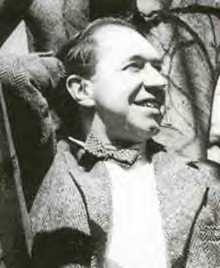The Warsaw Concerto is Addinsell's most famous and oft performed composition. It was written apart of the score ( or I should say, as the score ) to a little known film called Dangerous Moonlight ( 1941 ) starring Anton Walbrook. Prior to this Addinsell had wrote scores for Dark Journey, Fire Over England, The Lion Has Wings and Goodbye, Mr.Chips.
The Warsaw Concerto's unexpected popularity ( it has been recorded over 100 times and had sales in excess of 3 million dollars ) was both a blessing as well as a curse because it's fame has obscured all of his other works; works that are just as magnificent and beautiful even if they aren't well known.
Richard Addinsell was born in London, England on January 13, 1904. After being homeschooled by his mother, he enrolled in the Hertford College in Oxford to presumably study law, but after only 18 months Addinsell quit and decided to focus his interest on music. He then enrolled at the Royal College of Music but only remained there a few months as well. His non-traditional educational upbringing made him restless at traditional schools and so he decided to pursue his own line of music study through "on-hands" learning. This proved just as good as a formal education.
 |
| Goodbye Mr.Chips |
After touring Europe he wrote incidental music for a variety of British plays and radio programs. One of these plays introduced him to Douglas Fairbanks Jr. who along with writer Clemence Dane, led him into the film industry in 1936 with the job of writing the score to The Amateur Gentleman.
For the next 20 years Addinsell was kept busy writing film scores ( Love on the Dole, Blithe Spirit, Under Capricorn, Passionate Friends ) as well as some twenty documentaries for the Ministry of Information. A chance meeting with comedienne/actress Joyce Grenfell launched a lifelong friendship and collaboration with her on music for her one-woman shows. Between these film and stage projects, Addinsell was also busy doing work for BBC radio plays and television - where the bulk of his "light music" played as openings to shows.
 |
| The Passionate Friends |
The majority of Addinsells film scores prior to 1950 were destroyed by the studios ( a common practice, as they felt there was no use for them after a films release ) but many of these beautiful works were re-constructed from the films themselves by composer Philip Lane and have been performed by Kenneth Allwyn and Rumon Gamba and released as collections on cd.
Below are just a few sample sound clips from some of Richard Addinsells large body of work. A quiet man in real life, he used music as a way to release his inner passion and the heart-felt emotions he experienced can be heard in many of his compositions. He also made frequent use of the piano in his music - being an excellent pianist himself - and this feature seems to make even his most ambitious of light classical pieces appealing to the mass audience. It also anticipated the piano/orchestra style later popularized during the 1960s by Ferrante and Teicher, and Roger Williams.
Tom Brown's School Days - was written for the 1951 film starring John Howard Davies and Robert Newton.
Click here to play music
The Isle of Apples - is a beautiful melody written in the English pastoral style. This miniature evokes a medieval reverie and it's title most likely refers to Avalon, the legendary burial place of King Arthur.
Click here to play music
The Smokey Mountains Concerto - First Movement - Addinsell rarely wrote music that was not assigned for a film or a stage work but this is one case that he did. It is a 15 minute piece written in three parts...First Movement, Valley Song and Old Joe Clark and captures the folk history of America.
Click here to play music
A Tale of Two Cities - Richard Addinsell had hoped that A Tale of Two Cities would of "taken off" as a success like Warsaw Concerto but it did not, and today even the film it was written for ( starring Dirk Bogarde ) is not remembered all that well.
Click here to play music
Appleshaw's Allure - The title of this lovely song is actually Tune in G, but that was such a dull name I redubbed it Appleshaw's Allure. Appleshaw was the name of the country home where Addinsell's parents resided and where this song was first composed.
Click here to play music





